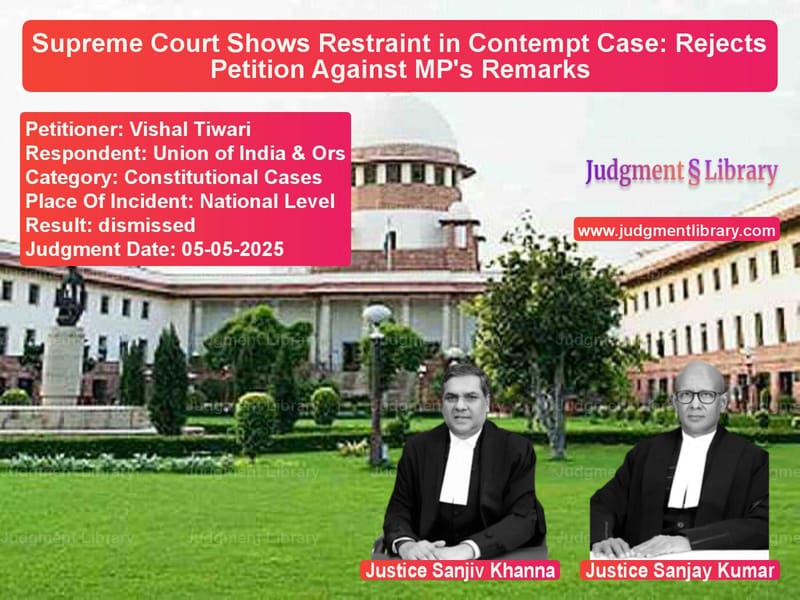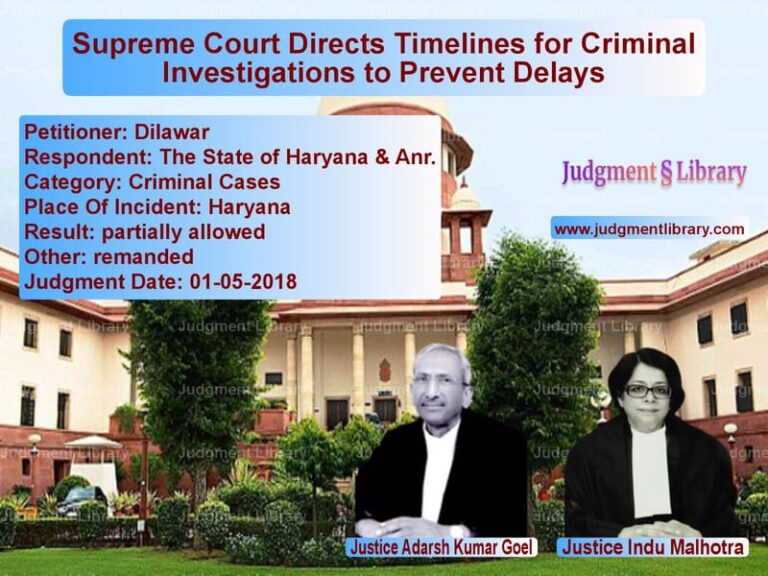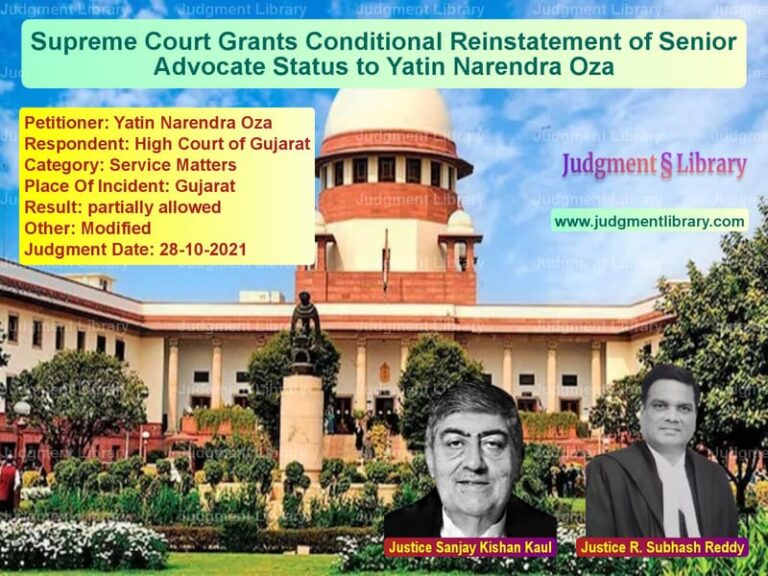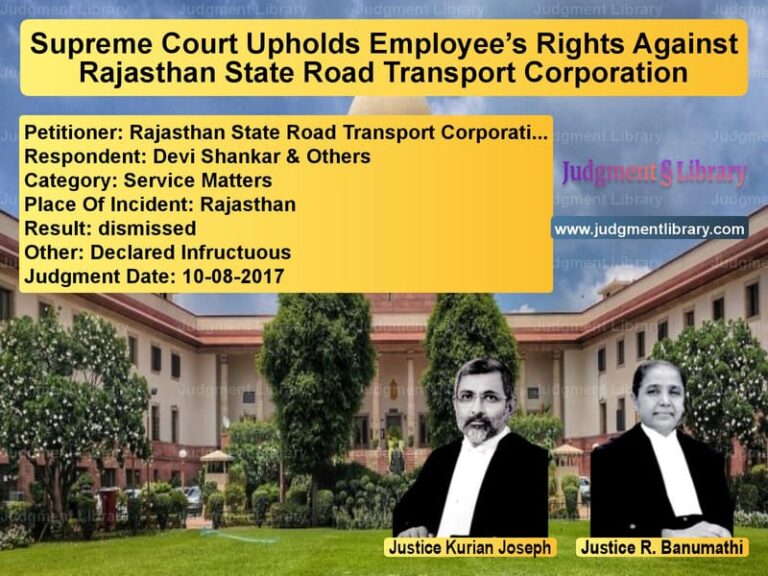Supreme Court Shows Restraint in Contempt Case: Rejects Petition Against MP’s Remarks
In a significant demonstration of judicial restraint and institutional strength, the Supreme Court of India has dismissed a petition seeking contempt proceedings against Member of Parliament Nishikant Dubey for his controversial remarks about the judiciary. The case, filed by Vishal Tiwari, sought criminal contempt action against Dubey for what were described as “deliberate and scandalizing remarks against the Supreme Court of India and the Chief Justice of India.” The petition also requested directions for filing an FIR under the Bharatiya Nyaya Sanhita, 2023, and issuing advisories to curb hate speeches related to the Waqf (Amendment) Act, 2025.
The Supreme Court bench comprising Chief Justice Sanjiv Khanna and Justice Sanjay Kumar, while acknowledging the objectionable nature of the comments, chose not to exercise its contempt powers, instead emphasizing the resilience of judicial institutions and the importance of free speech in a democracy. The Court’s decision reflects a mature approach to handling criticism while maintaining the dignity of the judiciary.
The Court began by establishing the constitutional framework for free speech and contempt powers, stating: “Judicial pronouncements result in an order or a decision which may aggrieve a party or sometimes a section of the public. Critical analysis and objective criticism of an order’s reasoning or even its outcome is protected under the fundamental right to free speech and expression under clause (a) of Article 19(1) of the Constitution of India.” This acknowledgment of the right to criticize judicial decisions set the tone for the Court’s restrained approach.
However, the Court also clarified the boundaries of contempt, explaining that “The power of criminal contempt, however, is exercised by courts when publication by words, spoken or written, by signs, or by visible representation or otherwise, in terms of clause (c) of Section 2 of the Contempt of Courts Act, 1971, is with the intent to scandalize or lower the authority of the courts; or tends to scandalize or lower such authority; prejudices or interferes or tends to interfere with the due course of judicial proceedings; or interferes or tends to interfere with or obstructs or tends to obstruct the administration of justice in any manner.”
The Court examined the specific remarks made by Nishikant Dubey, which included statements naming the Chief Justice of India as “responsible for all the civil wars happening in India” and claiming that “in order to incite religious wars in this country, it is only and only the Supreme Court that is responsible.” The Court noted that “There is no ‘civil war’ in India” and found the comments to be “highly irresponsible and reflect a penchant to attract attention by casting aspersions on the Supreme Court of India and the Judges of the Supreme Court.”
Despite recognizing the objectionable nature of the comments, the Court displayed remarkable institutional confidence, stating: “At the same time, we are of the firm opinion that courts are not as fragile as flowers to wither and wilt under such ludicrous statements. We do not believe that the confidence in and credibility of the courts in the eyes of the public can be shaken by such absurd statements, though it can be said without the shadow of doubt that there is a desire and deliberate attempt to do so.”
The Court drew upon the precedent set in the landmark case of In Re S. Mulgaokar (1978), where it was observed that “the judiciary is not immune from criticism, but when criticism is an obvious distortion or a gross misstatement, which is made in a manner designed to lower the respect of the judiciary and destroy public confidence, it should not be ignored.” However, the Court emphasized that “the power to initiate contempt is discretionary in its unsheathed exercise. Every commission of contempt need not erupt in an indignant committal or levy of punishment, however deserving it may actually be.”
The judgment beautifully articulated the philosophical foundation of judicial restraint, noting that “It is so because judges are judicious, their valour non-violent and their wisdom springs into action when played upon by a volley of values, the least of which is personal protection. Courts believe in values like free press, fair trial, judicial fearlessness and community confidence. Thus, courts need not protect their verdicts and decisions by taking recourse to the power of contempt.”
The Court expressed confidence in the public’s ability to discern between legitimate criticism and malicious attacks, stating: “Surely, courts and judges have shoulders broad enough and an implicit trust that the people would perceive and recognize when criticism or critique is biased, scandalous and ill-intentioned.”
In a significant constitutional exposition, the Court explained the role of judicial review in India’s democracy: “Each branch of the State in a democracy, be it the legislature, executive or the judiciary, especially in a constitutional democracy, acts within the framework of the Constitution. It is the Constitution that is higher than all of us. It is the Constitution which imposes limits and restrictions on the powers vested in the three organs. The power of judicial review is conferred by the Constitution on the judiciary.”
The Court emphasized that “To deny the power of judicial review to the courts would be to rewrite and negate the Constitution, as the power of judicial review is one of the cornerstones of democracy. This power is conferred in express terms by Articles 32 and 226 by the framers of the Constitution and hinges on the system of checks and balances.”
Addressing the public’s understanding of judicial functions, the Court observed: “We believe that the general public does know the relationship amongst the three wings of the Government and their different roles. They are aware of the function and the role of the judiciary, which is to judicially review the actions of the other branches and to evaluate whether the other branches are acting lawfully under the Constitution.”
The Court made it clear that “Judicial decisions are made in accordance with legal principles and not in keeping with political, religious or community considerations. When citizens approach the court praying for exercise of the power of judicial review, they do so in furtherance of their fundamental and/or legal rights. The court’s consideration of such a prayer is the fulfilment of its constitutional duty.”
While dismissing the contempt petition, the Court issued a strong warning against hate speech, stating: “While we are not entertaining the present writ petition, we make it clear that any attempt to spread communal hatred or indulge in hate speech must be dealt with an iron hand. Hate speech cannot be tolerated as it leads to loss of dignity and self-worth of the targeted group members, contributes to disharmony amongst groups, and erodes tolerance and open-mindedness, which is a must for a multi-cultural society committed to the idea of equality. Any attempt to cause alienation or humiliation of the targeted group is a criminal offence and must be dealt with accordingly.”
The Supreme Court’s decision represents a sophisticated balancing act between protecting judicial dignity and preserving freedom of expression. By choosing not to exercise its contempt powers in this instance, the Court has demonstrated that true institutional strength lies not in silencing critics but in withstanding criticism through the power of reason and constitutional legitimacy.
This judgment reinforces the principle that in a vibrant democracy, even institutions as crucial as the Supreme Court must be subject to public scrutiny and criticism, while simultaneously maintaining that such criticism should not cross into the territory of malicious falsehoods designed to undermine public confidence in the judiciary.
The Court’s approach sends a powerful message about the maturity of India’s democratic institutions and their capacity to handle dissent and criticism without resorting to punitive measures. It reflects the confidence of an institution that derives its authority not from the fear of contempt but from the legitimacy of its constitutional role and the quality of its decision-making.
This decision will likely be cited in future cases involving the balance between free speech and contempt of court, establishing a precedent for judicial restraint in the face of political criticism while maintaining clear boundaries for acceptable discourse about judicial institutions.
Petitioner Name: Vishal Tiwari.Respondent Name: Union of India & Ors.Judgment By: Justice Sanjiv Khanna, Justice Sanjay Kumar.Place Of Incident: National Level.Judgment Date: 05-05-2025.Result: dismissed.
Don’t miss out on the full details! Download the complete judgment in PDF format below and gain valuable insights instantly!
Download Judgment: vishal-tiwari-vs-union-of-india-&-ors-supreme-court-of-india-judgment-dated-05-05-2025.pdf
Directly Download Judgment: Directly download this Judgment
See all petitions in Contempt Of Court cases
See all petitions in Fundamental Rights
See all petitions in Constitution Interpretation
See all petitions in Public Interest Litigation
See all petitions in Separation of Powers
See all petitions in Judgment by Sanjiv Khanna
See all petitions in Judgment by Sanjay Kumar
See all petitions in dismissed
See all petitions in supreme court of India judgments May 2025
See all petitions in 2025 judgments
See all posts in Constitutional Cases Category
See all allowed petitions in Constitutional Cases Category
See all Dismissed petitions in Constitutional Cases Category
See all partially allowed petitions in Constitutional Cases Category







